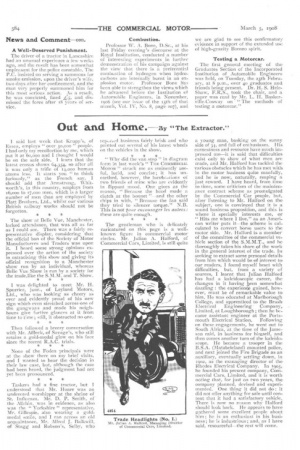Out and Home.-- - a " The Extractor."
Page 16

If you've noticed an error in this article please click here to report it so we can fix it.
I said last weekthat Krupp 's, of Essen, employs " over 50,000 " people. I had only my recollection by me, which put it at 6o,000 and I thought I would be on the safe side. T learn that the latest census shows 64,354, so after all it was only a trifle of I4,000 human atoms less. It starts you "to think furiously,'' as the French say. I should add that Armstrong, Whitworth's, in this country, employs from 16,000 to 17,000 men, which is a larger number of men than are employed by Platt Brothers, Ltd., whilst our various British railway works should not be forgotten.
The show at Belle Vue, Manchester, lacked attendance, that was all as far as I could see. There was a fairly representative display, considering that the official ban of the Society of Motor Manufacturers and Traders was upon it. I heard some strong opinions expressed over the action of the society in ostracising this show and giving its official recognition to a Manchester show run by an individual, whereas Belle Vue Show is run by a society for the trade,like the S.M.M. and T. Show.
I was delighted to meet Mr. H. Spurrier, junr., of Leyland Motors, Ltd., who was looking as cheery as ever and evidently proud of his new sign which even stretched across one of the gangways and made his neighbours give furtive glances at it from time to time ; still, it obstructed no one.
Then followed a breezy conversation with Mr. Affleck, of Savage's, who still retains a gold-medal glow on his face since the recent R.A.C. trials.
None of the Foden principals were at the show there on my brief visits, and I wanted to hear the decision in their law case, but, although the case had been heard, the judgment had not yet been pronounced.
Taskers had a fine tractor, but I understood that Mr. Hoare was an unde.voted worshipper at the shrine of St. Influenza. Mr. D. P. Smith, of the Allchin, was in evidence, as also was the " Yorkshire " representative, Mr. Gillespie, also wearing a goldmedal smile, and I ran across an old acquaintance, Mr. Alfred J. Balkwill, of Stagg and Robson's, Selby, who
rep,r,ed business fairly brisk and who pointed out several of his latest wheels on the vehicles in the show.
" Why did the van stop " in diagram form in last week's " THE COMMERCIAL MOTOR " struck me as eminently useful, lucid, and concise; it has um earthed, however, the lucubi-a [ions of two friends of mine who are evidently in flippant mood. One gives as the reason, " Because the hood made a clutch at the bonnet "—and the other chips in with, " Because the fan said they tried to silencer torque." N.B. This is not Pour encourager les antics : these are quite enough.
The gentleman who is delicately caricatured on this page is a wellknown figure in commercial motor circles. Mr. Julian A. Halford, of Commercial Cars, Limited, is still qui e
a young man, basking on the sunny side of 34, and full of enthusiasm. Hi* earnestness and resource have much impressed me—it is said that difficulties. exist only to show of what men are made, and Mr. Halford has tackled the various obstacles which he has met with in the motor business quite manfully. and he is now, naturally, reaping a just reward. I have heard, from time to time, some criticism of the maintenance contract scheme as promulgated by the Commercial Car people, but, after listening to Mr. Halford on the subject, one is convinced that it is a sound business proposition, and this is where it specially interests me, or " Hits me where I live," as an American. writer puts it—the scheme is calculated to convert hbrse users to the motor side. Mr. Halford is a member of the committee of the commercial vehicle section of the S.M.M.T., and hethoroughly takes his share of the work in the general interest of the trade. Iii. seeking to extract some personal details from him which would be of interest toour readers, I found myself beset with difficulties, but, from a variety of sources, I learnt that Julian Halford has had a kaleidoscopic career, the changes in it having been somewhat dazzling : the experiene gained, however, must be of remarkable value to. him.He was educated at MarlborOugh College, and apprenticed to the Brush Electrical Engineering Company, Limited, at Loughborough ; then he became assistant engineer at the Ports
mouth Electrical Station. Following on these engagements, he went out tor South Africa, at the time of the Jameson raid, in business for himself, and then comes another turn of the kaleidoscope. He became a trooper in the B.S.A. (Matabeleland) mounted police, and next joined the Fire Brigade as an auxiliary, eventually settling down, in tooz, as the managing director of the Rhodes Electrical Company. In 1905, he founded his present company, Commercial Cars, Limited, and it is worth noting that, for just on two years, the company planned, devised and experimented. One thing it did not do : it did not offer anything for sale until content that it had a satisfactory vehicle. There is now no reason why Halford should lcok back. He appears to have gathered some excellent people about him; he is an enthusiast in his business ; he is industrious; and, as I have said, resourceful—the rest will come.
























